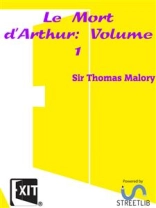THE Morte D'Arthur was finished, as the epilogue tells us, in the ninth year of Edward IV., i.e. between March 4, 1469 and the same date in 1470. It is thus, fitly enough, the last important English book written before the introduction of printing into this country, and since no manuscript of it has come down to us it is also the first English classic for our knowledge of which we are entirely dependent on a printed text. Caxton's story of how the book was brought to him and he was induced to print it may be read farther on in his own preface. From this we learn also that he was not only the printer of the book, but to some extent its editor also, dividing Malory's work into twenty-one books, splitting up the books into chapters, by no means skilfully, and supplying the "Rubrish" or chapter-headings. It may be added that Caxton's preface contains, moreover, a brief criticism which, on the points on which it touches, is still the soundest and most sympathetic that has been written.
Caxton finished his edition the last day of July 1485, some fifteen or sixteen years after Malory wrote his epilogue. It is clear that the author was then dead, or the printer would not have acted as a clumsy editor to the book, and recent discoveries (if bibliography may, for the moment, enlarge its bounds to mention such matters) have revealed with tolerable certainty when Malory died and who he was. In letters to The Athenaeum in July 1896 Mr. T. Williams pointed out that the name of a Sir Thomas Malorie occurred among those of a number of other Lancastrians excluded from a general pardon granted by Edward IV. in 1468, and that a William Mallerye was mentioned in the same year as taking part in a Lancastrian rising. In September 1897, again, in another letter to the same paper, Mr. A. T. Martin reported the finding of the will of a Thomas Malory of Papworth, a hundred partly in Cambridgeshire, partly in Hunts. This will was made on September 16, 1469, and as it was proved the 27th of the next month the testator must have been in immediate expectation of death. It contains the most careful provision for the education and starting in life of a family of three daughters and seven sons, of whom the youngest seems to have been still an infant. We cannot say with certainty that this Thomas Malory, whose last thoughts were so busy for his children, was our author, or that the Lancastrian knight discovered by Mr. Williams was identical with either or both, but such evidence as the Morte D'Arthur offers favours such a belief. There is not only the epilogue with its petition, "pray for me while I am alive that God send me good deliverance and when I am dead pray you all for my soul, " but this very request is foreshadowed at the end of chap. 37 of Book ix. in the touching passage, surely inspired by personal experience, as to the sickness "that is the greatest pain a prisoner may have"; and the reflections on English fickleness in the first chapter of Book xxi., though the Wars of the Roses might have inspired them in any one, come most naturally from an author who was a Lancastrian knight.
Sir Thomas Malory
Le Mort d’Arthur: Volume 1 [EPUB ebook]
Le Mort d’Arthur: Volume 1 [EPUB ebook]
Köp den här e-boken och få 1 till GRATIS!
Språk Engelska ● Formatera EPUB ● ISBN 9788834149140 ● Filstorlek 0.5 MB ● Utgivare CAIMAN ● Publicerad 2019 ● Nedladdningsbara 24 månader ● Valuta EUR ● ID 7060769 ● Kopieringsskydd Social DRM












